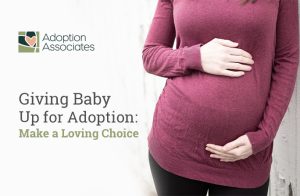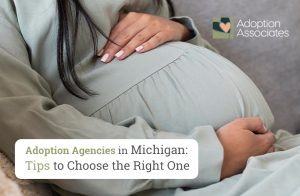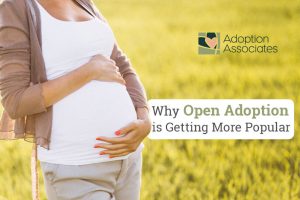Blog talk Radio Transcript: Adoption Registry – Air Date: 5/28/19: What You Need To Know About Michigan’s Central Adoption Registry (You may listen to the podcast by clicking on the audio link, or read the transcript of the podcast below.)
Are you an adult adoptee and curious about your birth parents? Maybe you just found out that you have a brother or sister that was placed for adoption. Is it possible to find them? What is the process? In this podcast you will hear from Connie Stevens, a representative for Michigan’s Central Adoption Registry who will explain what it is, what it isn’t, and what kind of information can be obtained.
 Jennifer J.: Hi, and welcome to Adoption Focus. My name is Jennifer Jaworski and I am a social worker with Adoption Associates in Michigan. This is Adoption Associates premier talk radio blog show. Adoption Associates and its staff are trusted leaders in adoption and have placed over 5,200 children into loving homes. Since 1990, Adoption Associates has advocated, supported, and nurtured both birth families and adoptive families, and helping all families grow through the adoption process is important to us. Our offices are located in Jenison, Lansing, Farmington Hills, and the mid-Michigan Saginaw area, and our private adoption services are available throughout all of Michigan.
Jennifer J.: Hi, and welcome to Adoption Focus. My name is Jennifer Jaworski and I am a social worker with Adoption Associates in Michigan. This is Adoption Associates premier talk radio blog show. Adoption Associates and its staff are trusted leaders in adoption and have placed over 5,200 children into loving homes. Since 1990, Adoption Associates has advocated, supported, and nurtured both birth families and adoptive families, and helping all families grow through the adoption process is important to us. Our offices are located in Jenison, Lansing, Farmington Hills, and the mid-Michigan Saginaw area, and our private adoption services are available throughout all of Michigan.
One of Adoption Associate’s commitments is to these podcasts, so we are very grateful to you, our listeners for being with us and listening to our program. We hope that you find this forum to be inspirational, educational, and thought provoking. And today I am happy to be talking about a subject that we have not yet discussed on the podcast. The title of today’s program is, “What You Need to Know About Michigan’s Central Adoption Registry”, and our guest today is Connie Stephens. Connie, welcome to the show.
Connie Stephens: Thanks for having me Jennifer.
Jennifer J.: Thank you very much for taking time to come and share information about the Central Adoption Registry. Connie, I’d like to start with having you tell us a little bit about yourself, your role, and the work that you do.
Connie Stephens: Certainly, I am a licensed social worker in the State of Michigan, and I’ve been practicing in the field of foster care and adoption for over 25 years now. I’ve been working with the State of Michigan in my current role since 2013. I am the Central Adoption Registry and post adoption inquiry analyst.
Jennifer J.: Nice, nice. And you said, so for several years now you’ve been in this role. I know you have a lot of insight into this topic, and that’s why it was important for you to come and share information with us. For those people that are listening, I know some may be very familiar with the Central Adoption Registry, and some may not. If you could Connie, tell us what is the Central Adoption Registry in Michigan, and what is its purpose?
Connie Stephens: Well, the Michigan Department of Health and Human Services maintains the Central Adoption Registry. The Central Adoption Registry was created by statute in 1994 and became effective in January of 1995. Basically it’s a database that contains the written consent or denial statements from biological family members who are registering their desires within the registry. When an adult adoptee comes searching for information about their birth family, we have this consent or denial on file. The consent would allow us to release their contact information as it was provided to us.
Jennifer J.: Okay. So, the registry must contain thousands of files, is that correct?
Connie Stephens: Oh, yes. Tens of thousands.
Jennifer J.: Wow. And who is it that is allowed to access the registry information?
Connie Stephens: The Central Adoption Registry contains highly confidential information, and it is not accessible by an individual.
The Central Adoption Registry is accessible by the entity that is working for a person who’s searching for information. It may be a court, a private agency that’s working with an adult adoptee (or birth family member), or the Department of Health and Human Services (DHHS).
When someone approaches one of those entities to search for information about an adoptee or birth family, the central adoption registry must be checked for consents or denials from birth family members prior to releasing any information. And again, that is by State of Michigan statute.
Jennifer J.: Okay. And so if you were to receive a phone call from an adult adoptee, requesting or wanting information, what would you ask of them? What would they need to do?
Connie Stephens: Well, first you would want to determine who holds their adoption record, their closed adoption record. And only an entity that holds their records could obviously respond to their request for information, and or search the Central Adoption Registry for possible consents or denials.
So, for example, your agency holds … Retains permanently all of your adoption records. So an adult adoptee that was placed for adoption through your agency would start their search for information about birth family with your agency.
Jennifer J.: Okay.
Connie Stephens: An adult adoptee who was placed for adoption through the child welfare system or the State of Michigan, MDHHS holds their closed adoption records. So the adult adoptee would make their requests here at my office for information from their closed adoption records.
Jennifer J.: And if an individual is uncertain about what agency, or if it was private, and they just were unsure or they didn’t have that information, what would their next step need to be?
Connie Stephens: Well, if I have an opportunity to speak with them, I can try to help them discern where they might begin their search for information.
Sometimes, they know those answers, but if they don’t know any of that, I always suggest they start with the State first. We hold the largest number of closed adoption records. We have records that we’ve retained permanently since the late 1800’s. And if we don’t have your record here, I will then make a recommendation in my letter on where you should search next. And that will either be an agency and/or the court. The courts always retain adoption information for every adoption that they presided over or confirmed. So there is always some information about every adoption at the court that confirmed or finalized the adoption.
Jennifer J.: Okay. So let’s jump ahead a little bit. An individual identifies the agency that assisted in their adoption and the agency reaches out to the central adoption registry for information. You mentioned before that there will be a determination whether or not there is a consent or a denial on file. Can you talk a little bit more about what that means?
Connie Stephens: Yes. The consent or denial form is available on our website. Any biological parent or biological sibling, as well as the adoptee themselves, can obtain this form from our website and complete it by checking the appropriate box. They may check “I give consent”, or “I do not give consent” to release their name and identifying information to the adult adoptee. We recommend that the form be updated anytime you have a change in address or phone number because that’s the information that would be provided to the adult adoptee should they come search.
Jennifer J.: If there is no form at all that’s been filed, whether it’s a consent or denial, what does that mean for the adult adoptee who is seeking the information?
Connie Stephens: Well that is a larger issue. Currently in the laws of the State of Michigan, there are two dates that determine what type of information an adult adoptee can receive. And in the State of Michigan if biological parental rights were terminated between May 28, 1945 and September 12, 1980, you can receive all of the identifying information in your closed adoption records if there is no denial on file from your biological parent.
So that means if there is no denial, there are no statements to send in the registry. Then the entity that’s working with the adult adoptee can release information to them including birth parent name, last known address and full names of siblings – anything that is contained in those closed adoption records. Also, within the current adoption statute for the State of Michigan, if the biological parents parental rights were terminated between May 28, 1945 and September 12, 1980, we have to have consent from the biological parents in order to release identifying information. So there has to be written consent in the Central Adoption Registry. So if there is no consent, there are no statements, and that adult adoptee will get only non-identifying information.
Jennifer J.: Okay. So that’s why it’s also very important for individuals to reach out to the entity that assisted in their adoption because this is very involved in what you’re describing to us here. What would you say are the limitations of the registry?
Connie Stephens: Well, the limitation of the registry is that unfortunately, not all biological family members know that it exists. Also not widely know is that there is a proxy form for a deceased parent. So if the biological parent is deceased, the biological sibling can place consent in the registry as a proxy for the deceased parent. If there is consent in the registry, that makes things very easy as far as an adult adoptee being able to obtain the identifying information about their biological family. And that’s usually what they’re searching for, their names and how to connect with them.
Jennifer J.: And what about a situation Connie, where a child is not yet 18 years old and an adoptive parent wants to assist a minor in getting information. Are there guidelines for that?
Connie Stephens: There is. The adoptive parents of a minor adopted child can receive information from their child’s closed adoption records, but only non-identifying information. They would contact the entity that confirmed their adoption or assisted in their adoption in order to obtain that. However, they should have received that information at the time of the adoption. By law, all of that information should be provided to the adopting family at the time of the adoption. However, we do know sometimes that information is destroyed in a natural disaster, or misplaced or lost and DHHS or the private agency can replace that information after receiving a request for it.
Jennifer J.: Could you take a minute to help our listeners understand the distinction between identifying and non-identifying information?
Connie Stephens: Identifying information is the actual names, dates of birth, last known address of biological parents and or biological siblings that’s listed in the records. And along with that they would also get the more narrative descriptive information about their biological family or how they came into care or came to be adopted. Non-identifying information includes their ethnicity, their religious background, a physical description of the parent, etc. It also includes the age and sex of their siblings, what the birth parent’s occupations were and their educational level. The circumstances that brought them to make the decision or have the child placed for adoption, whether it was involuntary or voluntary is also non-identifying. An adoptee can obtain non-identifying information at any time.
Jennifer J.: Okay. Thank you for that. What would you say are some of the common misunderstandings related to what the registry can provide?
Connie Stephens: The Central Adoption Registry is exclusively just the file including the denial or consent statements from biological family members or the adult adoptee themselves. The release of information from a closed adoption record is something separate. However, what someone gets as far as the information that they will receive is dependent upon what is in the central adoption registry. So they’re connected, but they’re two very different roles or two very different processes.
Jennifer J.: I see. And I know Connie, you said earlier that we’re talking today about the Michigan Department of Health, Health and Human Services Central Adoption Registry. Do you know if a similar type of registry exist in all other states or some other states or do you have any information about that?
Connie Stephens: Yes, I don’t have any specific information, but I do know that other states have similar registries for birth parents and births siblings. And some states have adoption statutes very similar to ours. Some states have completely open adoption records and the only thing that prevents disclosure of information would be a denial form. So every state is different.
Jennifer J.: Okay. We are nearing the end of our podcast for today and I’m wondering if there’s any important aspects of the Central Adoption Registry that we haven’t discussed. Are there any other thoughts that you’d like to make sure we talk about before we finish?
Connie Stephens: Well, one of the most important things is again to remember that the Central Adoption Registry is not accessible to an individual. A birth parent or an adult adoptee or a biological sibling cannot simply contact the DHHS and ask that the registry be checked. There is a process for requesting information about an adoptee, or the adoptee requesting information about birth family. And then ultimately again the court, the state, or the agency will access the registry for them, which will then determine what type of information they will get.
The other piece of information is I want to share is that a denial does not forever seal identifying information to the adult adoptee. The death of the biological parent, confirmation of that by a death certificate does supersede a denial.
Jennifer J.: Okay. And I think that you touched on this earlier about who is able to have their name on the registry, or to include or submit this form to the registry? Is it birth parents only? Could you elaborate just a little bit about what individuals are allowed to submit their information?
Connie Stephens: Yes, it is. Birth parents and siblings that are biological and/or through adoption to the adult adoptee can submit their consent or denial, so siblings and birth parents. And then again as I said, siblings can submit a proxy form for their deceased parents and there is a separate form for that. That also must include a copy of the death certificate.
Jennifer J.: Okay, I see. Do you ever have adult adoptees wanting to have information included in the registry as well?
Connie Stephens: Yes, we do. There is a form that is available to the adoptees as well and it is a release of information authorization form. It doesn’t quite say consent or denial, but it is an authorization form which allows the adoptees current identifying information to be shared with biological parents or adult siblings, should they come searching for them.
Jennifer J.: Okay, and if somebody listening maybe wanted to understand this or learn a little more information, is there a website or a place that they could go to just to read some of the guidelines and get a better understanding of it?
Connie Stephens: Yes. You would want to look in the website, https://www.michigan.gov/mdhhs/, which stands for Michigan Department of Health and Human Services. When that main page comes up, you’ll want to click through to the Foster Care Adoption portal which will provide you with links to all these forms that we’re discussing. It will also provide information about the Central Adoption Registry and information about Michigan’s current adoption laws. Other resources that are available to members of the adoption triad can also be found there.
Jennifer J.: That’s wonderful information. Thank you so much for your time today, Connie. I know that this is a topic that we hadn’t previously discussed and that I think there is a great deal of misunderstanding about it. Even as an adoption professional, it’s a great refresher for me and for some of our staff as well. So we appreciate you very much for being on Adoption Focus today.
Connie Stephens: Thank you for having me.
Jennifer J.: For those of you that are listening and interested potentially in connecting with Adoption Associates for information, you can feel free to call us at 800-677-2367, or visit our website www.adoptionassociates.net.
For now, this is Jennifer on Adoption Focus. I hope you all have a great day. Bye-bye.



